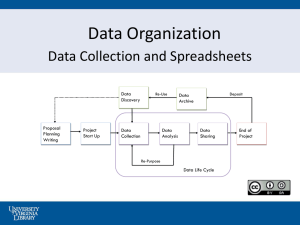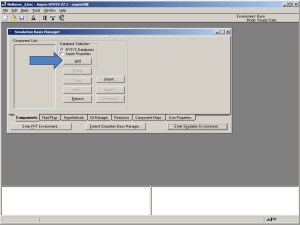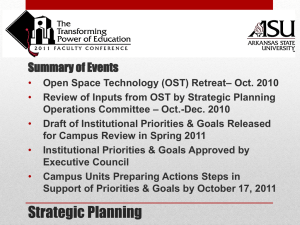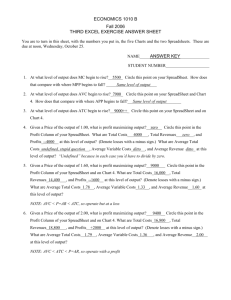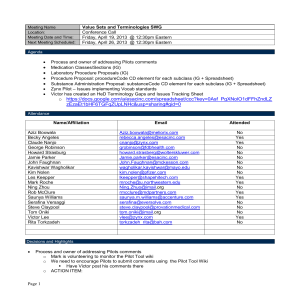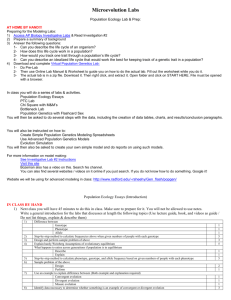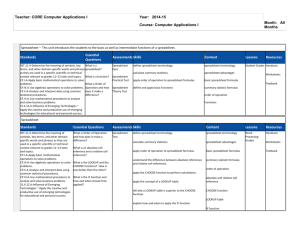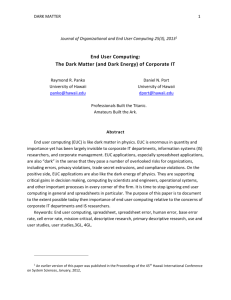PHYSICS 276 EXPERIMENTAL PHYSICS II: ELECTRICITY AND
advertisement
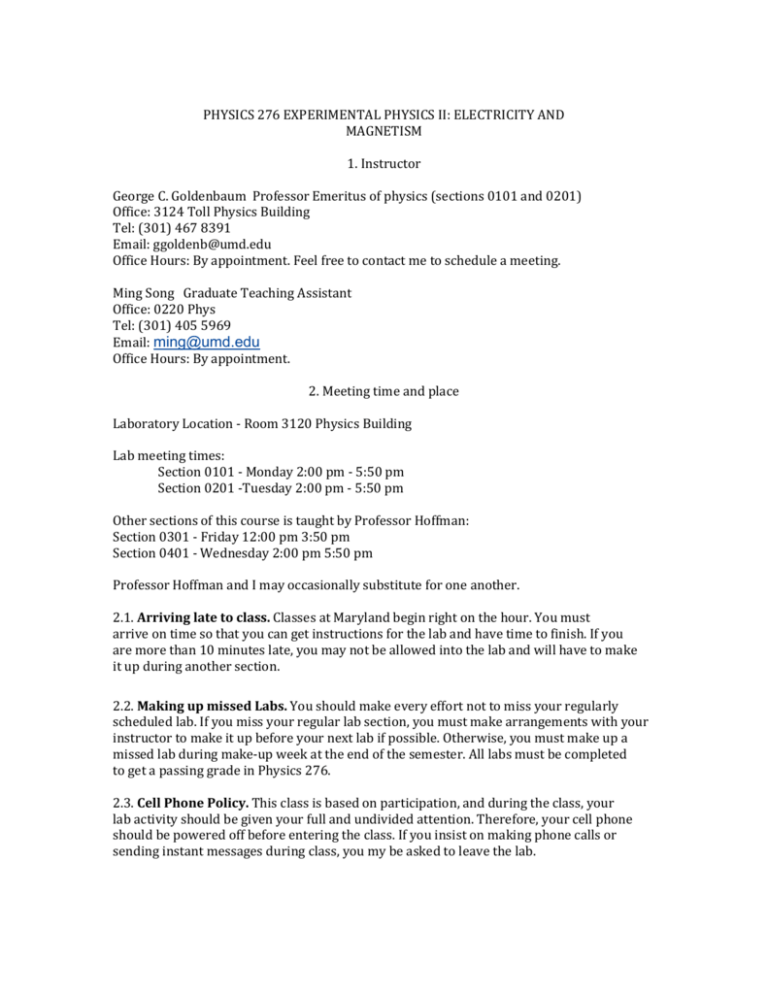
PHYSICS 276 EXPERIMENTAL PHYSICS II: ELECTRICITY AND MAGNETISM 1. Instructor George C. Goldenbaum Professor Emeritus of physics (sections 0101 and 0201) Office: 3124 Toll Physics Building Tel: (301) 467 8391 Email: ggoldenb@umd.edu Office Hours: By appointment. Feel free to contact me to schedule a meeting. Ming Song Graduate Teaching Assistant Office: 0220 Phys Tel: (301) 405 5969 Email: ming@umd.edu Office Hours: By appointment. 2. Meeting time and place Laboratory Location - Room 3120 Physics Building Lab meeting times: Section 0101 - Monday 2:00 pm - 5:50 pm Section 0201 -Tuesday 2:00 pm - 5:50 pm Other sections of this course is taught by Professor Hoffman: Section 0301 - Friday 12:00 pm 3:50 pm Section 0401 - Wednesday 2:00 pm 5:50 pm Professor Hoffman and I may occasionally substitute for one another. 2.1. Arriving late to class. Classes at Maryland begin right on the hour. You must arrive on time so that you can get instructions for the lab and have time to finish. If you are more than 10 minutes late, you may not be allowed into the lab and will have to make it up during another section. 2.2. Making up missed Labs. You should make every effort not to miss your regularly scheduled lab. If you miss your regular lab section, you must make arrangements with your instructor to make it up before your next lab if possible. Otherwise, you must make up a missed lab during make-up week at the end of the semester. All labs must be completed to get a passing grade in Physics 276. 2.3. Cell Phone Policy. This class is based on participation, and during the class, your lab activity should be given your full and undivided attention. Therefore, your cell phone should be powered off before entering the class. If you insist on making phone calls or sending instant messages during class, you my be asked to leave the lab. 3. Textbooks 3.1. Required: PHYSICS 276 Laboratory Manual, Department of Physics, University of Maryland, College Park (Wiley Custom Learning Solutions, 2010, ISBN 978-0-470-97027-5). An Introduction to Error Analysis: The Study of Uncertainties in Physical Measurement", John R. Taylor (University Science Books, 1997, ISBN 0-935702-75-X). 3.2. Additional Reference Texts. A Practical Guide to Data Analysis for Physical Science Students by Louis Lyons, Cambridge University Press. Data Reduction and Error Analysis for the Physical Sciences", Phillip R. Bevington and D. Keith Robinson (McGraw Hill, Inc., 2003, ISBN 0-07-247227-8). Physics for Scientists and Engineers, Volume 2" by F. Tipler, the standard physics textbook, or any equivalent text, will be useful for explaining the basic physics in the course. Grading: 60% in-class spreadsheet 10% Lab Reports 10% Presentation (talk) 20% Final Practical Exam 4. Grading All experiments must be completed to pass the course. 4.1. Experiments. There are seven experiments (Lab 6 is split into two parts) as well as an introductory Lab (Experiment 0). Much of your in-class work will be carried out in Excel spreadsheets and you will need to turn in a copy of your spreadsheet at the end of each lab period. We will use the web (http://elms.umd.edu) to collect lab reports and post grades. Tips for Doing Well: (1) Read the lab manual carefully before you go to the lab and attempt an experiment. (2) Use your spreadsheet to record, plot and analyze your data in class as you collect it. Keep a complete record in the spreadsheet of the experiment including diagrams of measurement configurations actually used to obtain data, your results, and the analysis used to obtain the results. (3) Include estimates for the uncertainties in your measurements. Include systematic errors as well as statistical errors. (4) When something in the lab isn't making sense or isn't working raise your hand and discuss with your instructor. (5) Do not leave class unless you have finished your data analysis, discussed your results with your instructor and turned in your spreadsheet (6) Do not forget to turn in your complete lab report by the start of the next lab when required. 4.2. Lab Reports. You are required to submit a written report of your results for two of the experiments. The reports will be submitted electronically and will be due at the start of lab the following week. Your lab report should be submitted as an MS Word or PDF file, complete with data and figures. Both lab reports must be submitted on time not to incur a penalty. You will be deducted 5% of the maximum grade points allocated a day for each day the lab report is late. You will lose an additional letter grade for the course if you fail to submit both lab reports. An outline of the requirements for the report is available on the class web site. 4.3. In-class Spreadsheets. You are required to submit the spreadsheet you create in class before leaving class. The in-class spreadsheets will be graded out of 40 points as follows: +5 turn in spreadsheet +10 all data taken +5 errors assigned to all measured numbers (no partial credit) +10 all fits, calculations based on measured numbers, etc done (partial credit possible) +5 all errors on results of fits, calculations, etc done (partial credit possible) +5 spreadsheet is neat and well labeled 4.4. General Comments on Spreadsheets and Lab Reports. Finishing and submitting a complete spreadsheet as well as a lab report when required is very important. If you can't completely finish a lab, it is still important to turn in what you do have. When you are working on your spreadsheet or report, feel free to discuss among yourselves to try to figure out what is going on. By all means get together in small groups and discuss. However, do not use these discussions as an excuse to copy someone else's spreadsheet or report, or let someone else copy yours. That is cheating and is strictly forbidden. It is also very self-defeating since part of your grade will come from a practical test of your knowledge of lab content and procedure. The right way to proceed is to prepare your spreadsheet before class and write up your spreadsheet or report by yourself. With this preparation you can then discuss intelligently with your colleagues and see if you have missed something essential. Of course, you can always ask one of your instructors. 4.5. Late Reports. Late lab reports will be assessed a penalty of 5% per day. A missing lab report will cost one letter grade for the course. Missing a lab entirely, and not making it up will result in failure in the course. 4.6. Discussions. Part of a class meeting will be devoted to discussions of the physics and data analysis for the experiments. Participation in these sessions is just as important as the experiments themselves. Attendance is mandatory. However, this is not a lecture course, and the main way that you will learn experimental physics is to by doing and discussing, rather than just discussing. 4.7. Talks. Each student will give a 10 minute oral presentation on one of the Experiments. The report should be accompanied by electronic slides written in Power Point format (or equivalent) that is prepared in advance. Presentations should be on one of the Experiments from II to VII. 4.8. Lab Exam. A Practical Lab Exam will be administered at the last session of classes. It will cover the material of the experiments. Students will be expected to be able to repeat some of the experimental work and procedures they did in class as well as be able to explain the physics underlying the experiments. Knowledge of the workings of the instruments used in the lab may also be tested. If you fail to take the final exam you will be deducted an additional letter grade for the course. 4.9. Academic Integrity. The University of Maryland, College Park has a nationally recognized Code of Academic Integrity, administered by the Student Honor Council. This Code sets standards for academic integrity at Maryland for all undergraduate students. As a student, you are responsible for upholding the highest standards of academic integrity in this course and should be aware of the consequences of cheating, fabrication, facilitation, and plagiarism. For more information on the Code of Academic Integrity or the Student Honor Council, please visit http://www.studenthonorcouncil.umd.edu/whatis.html. 4.10. In case of Bad weather: Should this happen and the University is closed as a result during a scheduled lab, class will be cancelled, and we will most likely reschedule the lab for the following week. Closing is announced over local radio and TV as well as on the Universitys homepage. Dates Week starting Sept. 10 Week starting Sept. 17 Experiment Discussion & Lab 0 I Ohms Law Week starting Sept. 24 Week starting Oct. 1 II Magnetic Fields III RC & LR Circuits with Stepped Input IV RC Circuits with AC Input V-a LRC Circuits and Resonance V-b LRC Circuits and Resonance VI Diode VII Transistor Make-up week Thanksgiving Talks Lab Exam No Lab Week starting Oct. 8 Week starting Oct 15 Week starting Oct 22 Week starting Oct 29 Week starting Nov. 5 Week starting Nov 12 Week starting Nov 19 Week starting Nov 26 Week starting Dec 3 Week starting Dec 10 Reports Spreadsheet Spread Sheet and Analysis & Full Lab Report Spread Sheet and Analysis Spread Sheet and Analysis Spread Sheet and Analysis Spread Sheet and Analysis & Full Lab Report After V-b Spread Sheet and Analysis & Full Lab Report for V-a & V-b Spread Sheet and Analysis Spread Sheet and Analysis

